Our researchers
Our researchers are employed at one of our partner institutions: UiB, NORCE, IMR, or NERSC.
Camille Afonso
PhD candidate - Global Climate, UiB - University of Bergen

Andreas Alexander
Postdoc - Polar Climate, UiB - University of Bergen

Inge Althuizen
Forsker / Researcher - Carbon System, NORCE Research Centre
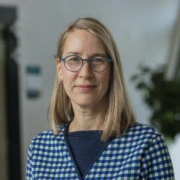
Carin Andersson
Forsker I / Researcher I - Polar Climate, NORCE Research Centre

Marianna Anichini
Postdoc - Climate Hazards, UiB - University of Bergen

Sofie Arstein
PhD Student, Institute of Marine Research

Nadine Arzt
PhD candidate - Carbon System, UiB - University of Bergen

Helene Asbjørnsen
Postdoc - Polar Climate, UiB - University of Bergen

Temesgen Gebremariam Asfaw
Postdoktor/ Postdoctoral researcher, UiB - University of Bergen

Lars Asplin
Forsker / Researcher - Polar Climate, Institute of Marine Research

Andreea Auer
Stipendiat / PhD Student - Polar Climate, UiB - University of Bergen

Helge Avlesen
Forsker / Researcher - Global Climate, NORCE Research Centre
Mohamed Babiker
Forsker / Researcher - Polar Climate, Nansen Environmental and Remote Sensing Center
Mostafa Bakhoday
Associate Professor - Polar Climate, UiB - University of Bergen

Jostein Bakke
Professor - Polar Climate, UiB - University of Bergen

Rondrotiana Barimalala
Forsker II / Researcher II - Global Climate, NORCE Research Centre

Pragallva Barpanda
Postdoc - Global Climate, UiB - University of Bergen

Helene Barthelemy
Postdoc - Polar Climate, UiB - University of Bergen

Sébastien Barthélémy
Forsker / Researcher - Global Climate, UiB - University of Bergen

Till Baumann
Postdoc - Polar Climate, Institute of Marine Research

Houda Beghoura
Postdoc - Carbon System, UiB - University of Bergen

Mats Bentsen
Forsker II / Researcher II - Global Climate, NORCE Research Centre

Antoine Bernigaud
Postdoc - Global Climate, Nansen Environmental and Remote Sensing Center

Laurent Bertino
Forskningsleder / Research Leader - Polar Climate, Nansen Environmental and Remote Sensing Center

Ingo Bethke
Forsker / Researcher - Global Climate, UiB - University of Bergen

Willem van der Bilt
Forsker / Researcher Professor - Climate Hazards, UiB - University of Bergen

Kristine Birkeli
Ph.D. Candidate - Carbon System, UiB - University of Bergen

Anne Elisabeth Bjune
Professor - Polar Climate, UiB - University of Bergen

Antonio Bonaduce
Seniorforsker, forskningsleder / Senior Scientist, Research Leader - Climate Hazards, Nansen Environmental and Remote Sensing Center

Andreas Born
Professor - Polar Climate, UiB - University of Bergen

Timothée Bourgeois
Forsker II / Researcher II - Carbon System, NORCE Research Centre

Guillaume Boutin
Forsker / Researcher - Polar Climate, Nansen Environmental and Remote Sensing Center

Julien Brajard
Forsker / Senior Researcher - Global Climate, Nansen Environmental and Remote Sensing Center

Ailin Brakstad
Overingeniør / Head Engineer - Polar Climate, UiB - University of Bergen

Jo Brendryen
Forsker / Researcher - Polar Climate, UiB - University of Bergen

Hai Bui
Researcher - Global Climate, UiB - University of Bergen

Heather Cannaby
Forsker / Researcher - Polar Climate, Institute of Marine Research

Jan Magne Cederstrøm
Overingeniør / Head Engineer - Climate Hazards, UiB - University of Bergen

David Chandler
Postdoc - Climate Hazards, NORCE Research Centre
Linling Chen
Research coordinator, UiB - University of Bergen

Yiyao Chen
UiB - University of Bergen

Ping-Gin Chiu
Overingeniør / Chief Engineer - Global Climate, UiB - University of Bergen

Svenya Chripko
Postdoc - Polar Climate, UiB - University of Bergen
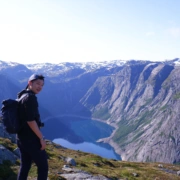
Hsin-Yu Chu
Stipendiat/PhD Student, UiB - University of Bergen

Sean Chua
Forsker / Researcher - Polar Climate, Nansen Environmental and Remote Sensing Center

Tristan Cordier
Seniorforsker / Senior Researcher - Carbon System, NORCE Research Centre

Damien Couespel
Researcher - Carbon System, NORCE Research Centre

François Counillon
Forsker / Senior Researcher - Global, Nansen Environmental and Remote Sensing Center

Kjersti Birkeland Daae
Førsteamanuensis / Associate Professor - Polar Climate, UiB - University of Bergen

Svein Olaf Dahl
Professor - Polar Climate, UiB - University of Bergen

Quentin Dalaiden
Forsker / Researcher, Nansen Environmental and Remote Sensing Center

Gillian Damerell
Postdoc - Polar Climate, UiB - University of Bergen

Elin Darelius
Professor - Polar Climate, UiB - University of Bergen

Richard Davy
Seniorforsker / Senior Researcher - Polar Climate, Nansen Environmental and Remote Sensing Center

Stijn De Schepper
Forsker / Research Professor - Climate Hazards, UiB - University of Bergen

Laura J. Dietrich
Researcher - Climate Hazards, UiB - University of Bergen

Hao Ding
Stipendiat / PhD Student - Global Climate, UiB - University of Bergen

Trond Martin Dokken
Forskningsdirektør / Research Director NORCE Climate - Climate Hazards, NORCE Research Centre

Josh Dorrington
Postdoctor - Global Climate, UiB - University of Bergen

Catherine Downy
Research coordinator, Nansen Environmental and Remote Sensing Center

Helge Drange
Professor - Global Climate, UiB - University of Bergen

Vår Dundas
Stipendiat / PhD Student - Polar Climate, Nansen Environmental and Remote Sensing Center

Etienne Dunn-Sigouin
Forsker II / Researcher II - Global Climate, NORCE Research Centre

Xabier Dávila
Postdoc - Carbon System, NORCE Research Centre

Jakob Dörr
Postdoc - Polar Climate, UiB - University of Bergen
Pirmin Philipp Ebner
Postdoc - Polar Climate, UiB - University of Bergen
Léo Edel
Postdoc - Polar Climate, Nansen Environmental and Remote Sensing Center

Dagmar Egelkraut
Senioringeniør / Senior Engineer - Carbon System, UiB - University of Bergen

Tobias Ehmen
Postdoctor, UiB - University of Bergen

Tor Eldevik
Professor - Polar Climate, UiB - University of Bergen

Peter Groth Farsund
PhD Student - Carbon System, UiB - University of Bergen

Vivian Astrup Felde
Forsker / Researcher - Climate Hazards, UiB - University of Bergen

Ilker Fer
Professor - Polar Climate, UiB - University of Bergen

Suzette Flantua
Forsker / Researcher - Global Climate, UiB - University of Bergen

Filippa Fransner
Forsker / Researcher - Carbon System, UiB - University of Bergen

Friederike Fröb
Researcher - Carbon System, UiB - University of Bergen

Håvard G. Frøysa
Forsker /Researcher - Climate Hazards, Institute of Marine Research

Rebekka Frøystad
Stipendiat / PhD Student - Polar Climate, UiB - University of Bergen

Natalya Gallo
Postdoc - Climate Hazards, UiB - University of Bergen
Natacha Galmiche
Stipendiat / PhD Student - Global Climate, UiB - University of Bergen

Shuang Gao
Forsker / Scientist - Carbon System, Nansen Environmental and Remote Sensing Center
Lilian Garcia
Stipendiat / PhD Student - Global Climate, UiB - University of Bergen

Joseph Gaudard
Stipendiat / PhD Student - Carbon System, UiB - University of Bergen

Sonya Geange
Researcher - Carbon System, UiB - University of Bergen

Erika Giorgi
PhD student - Polar Climate, UiB - University of Bergen

Inger Kristin Nesbø Gjøsæter
PhD candidate - Global Climate, UiB - University of Bergen

Heiko Goelzer
Forsker I / Research Professor - Climate Hazards, NORCE Research Centre

Ana Gomes
PhD Student - Carbon System, NORCE Research Centre

Silvana Gonzalez
Postdoctor - Climate Hazards, Institute of Marine Research

Nadine Goris
Forsker II / Researcher II - Carbon System, NORCE Research Centre

Sophia Groninger
PhD Student - Climate Hazards, UiB - University of Bergen

Robin Guillaume-Castel
Postdoctor - Global Climate, UiB - University of Bergen

Kjell Gundersen
Forsker / Researcher - Carbon System, Institute of Marine Research

Alok Kumar Gupta
Forsker II / Researcher II - Global Climate, NORCE Research Centre
Lucia Gutierrez-Loza
Postdoc - Polar Climate, NORCE Research Centre

Ragnhild Gya
Postdoc - Carbon System, UiB - University of Bergen

Ozan Mert Göktürk
Forsker II /Researcher II - Global Climate, NORCE Research Centre

Renee Hageman
PhD candidate - Carbon system, UiB - University of Bergen

Aud Helen Halbritter
Forsker / Researcher - Carbon System, UiB - University of Bergen

Bjarte Hannisdal
Førsteamanuensis / Associate Professor - Carbon System, UiB - University of Bergen

Johannes Hardeng
Stipendiat / PhD Candidate - Climate Hazards, UiB - University of Bergen

Konstanze Haubner
Forsker / Researcher - Polar Climate, UiB - University of Bergen

Shengping He
Forsker / Researcher - Global Climate, UiB - University of Bergen

Yanchun He
Forsker / Researcher - Global Climate, Nansen Environmental and Remote Sensing Center

Nina Hecej
PhD Research fellow - Climate Hazards, UiB - University of Bergen

Sigrid Passano Hellan
Senior Researcher - Global Climate, NORCE Research Centre

William Helland-Hansen
Professor - Climate Hazards, UiB - University of Bergen

Manuel Hempel
Stipendiat / PhD Student - Climate Hazards, NORCE Research Centre

Solfrid Sætre Hjøllo
Forsker / Researcher - Carbon System, Institute of Marine Research

Frida Snilstveit Hoem
Postdoc - Polar Climate, UiB - University of Bergen

Friederike Hoffmann
Seniorrådgiver / Research Coordinator, UiB - University of Bergen

Robinson Hordoir
Forsker / Researcher - Polar Climate, Institute of Marine Research

Christoffer Høvås
Stipendiat / PhD candidate, UiB - University of Bergen

Nil Irvali
Forsker / Researcher - Global Climate, UiB - University of Bergen

Kristin Jackson-Misje
Overingeniør / Chief Engineer - Carbon System, UiB - University of Bergen

Eystein Jansen
Professor - Polar Climate, UiB - University of Bergen

Emil Jeansson
Researcher II - Carbon System, NORCE Research Centre
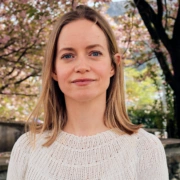
Mari Fjalstad Jensen
Forsker / Researcher - Climate Hazards, Institute of Marine Research

Truls Johannessen
Professor - Carbon System, UiB - University of Bergen
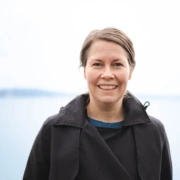
Ingrid Johnsen
Forsker / Scientist, Institute of Marine Research
Steffen Jørgensen
Associate professor, UiB - University of Bergen

Malte Jürchott
Postdoctor, UiB - University of Bergen

Pratik Kad
Postdoc - Climate Hazards, NORCE Research Centre

Hanif Kawousi
Stipendiat /PhD Candidate, UiB - University of Bergen

Noel Keenlyside
Professor - Global Climate, UiB - University of Bergen

Mika Kirkhus
PhD Student - Carbon System, UiB - University of Bergen

Helga Flesche Kleiven
Direktør / Director, UiB - University of Bergen

Andreas Klocker
Seniorforsker / Senior Researcher - Polar Climate, NORCE Research Centre

Erik Wilhelm Kolstad
Forsker I / Researcher I - Climate Hazards, NORCE Research Centre

Sher-Rine Kong
Stipendiat / PhD Student - Polar Climate, UiB - University of Bergen

Kjersti Konstali
Postdoc - Climate Hazards, UiB - University of Bergen

Anton Korosov
Forsker / Researcher - Polar Climate, Nansen Environmental and Remote Sensing Center
Mariko Koseki
Chief engineer - Global Climate, UiB - University of Bergen

Shunya Koseki
Forsker / Researcher - Global Climate, UiB - University of Bergen
Tor Olav Kristensen
Overingeniør / Chief Engineer - Carbon System, UiB - University of Bergen

Nils Gunnar Kvamstø
Director, Institute of Marine Research - Global Climate, Institute of Marine Research

Tom Langbehn
Forsker / Researcher - Polar Climate, UiB - University of Bergen

Nico Lange
Postdoc - Global Climate, NORCE Research Centre

Tor Einar de Lange
Senioringeniør / Senior Engineer - Carbon System, UiB - University of Bergen

Petra Langebroek
Forsker II / Researcher II - Polar Climate, NORCE Research Centre

Helene R. Langehaug
Forsker / Researcher - Polar Climate, Nansen Environmental and Remote Sensing Center

Linda Latuta
Stipendiat / PhD Student - Polar Climate, UiB - University of Bergen

Siv Kari Lauvset
Forsker II / Researcher II - Carbon System, NORCE Research Centre

Nine Le Reun
Postdoctor - Carbon system, NORCE Research Centre

Camille Li
Professor - Global Climate, UiB - University of Bergen
Fei Li
Forsker / Researcher - Global Climate, UiB - University of Bergen

Lu Li
Forsker II / Researcher II - Climate Hazards, NORCE Research Centre

Yan Li
Førstamanuensis / Associate Professor - Polar Climate, UiB - University of Bergen

Daniel Lid
Stipendiat /PhD Student, UiB - University of Bergen
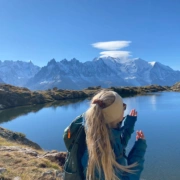
Elise Lie
Stipendiat /PhD Student, UiB - University of Bergen

Vidar Lien
Engineer - Polar Climate, Institute of Marine Research

Oskar Eide Lilienthal
Stipendiat / PhD Student - Global Climate, UiB - University of Bergen

Henriette Linge
Professor - Polar Climate, UiB - University of Bergen

Gabriella Ljungström
Postdoc - Global Climate, UiB - University of Bergen

Elco Luijendijk
Førsteamanuensis /Associate Professor - Climate Hazards, UiB - University of Bergen

Johannes Lutzmann
Stipendiat / PhD Student - Global Climate, UiB - University of Bergen

Anqi Lyu
Postdoktor / Postdoc - Polar Climate, Nansen Environmental and Remote Sensing Center

Marit Løland
Stipendiat / PhD Student - Global Climate, UiB - University of Bergen

Tyge Løvset
Seniorforsker / Senior Researcher - Global Climate, NORCE Research Centre

Jenny Maccali
Researcher - Global Climate, UiB - University of Bergen

Joeran Maerz
Forsker / Researcher - Carbon System, UiB - University of Bergen

Sanaz Zarif Mahdizadeh
PhD candidate - POLAR, UiB - University of Bergen

Vikram Maji
Postdoc - Climate Hazards, UiB - University of Bergen

Fabio Mangini
Forsker / Researcher - Climate Hazards, Nansen Environmental and Remote Sensing Center

Peter Manning
Professor - Climate Hazards, UiB - University of Bergen

Carlo Mans
PhD Candidate - Climate Hazards, UiB - University of Bergen

Andrea Marcheggiani
Postdoc - Global Climate, UiB - University of Bergen

Stephanie Mayer
Forsker II / Researcher II - Climate Hazards, NORCE Research Centre

Kyle Mayers
Senior Researcher - Polar Climate, NORCE Research Centre

Elaine McDonagh
Forsker II / Researcher II - Global Climate, NORCE Research Centre

Nele Meckler
Professor - Global Climate, UiB - University of Bergen

Iselin Medhaug
Forskningeleder / Research Director Forecasting Engine - Global Climate, NORCE Research Centre

Martin Miles
Forsker II / Researcher II - Polar Climate, NORCE Research Centre

Victoria Miles
Forsker / Researcher - Polar Climate, Nansen Environmental and Remote Sensing Center

Thorbjørn Østenby Moe
PhD student - Polar Climate, UiB - University of Bergen

Priscilla Mooney
Forsker / Research Professor - Climate Hazards, NORCE Research Centre

Kjell Arne Mork
Forsker / Scientist - Polar Climate, Institute of Marine Research

Mari Skuggedal Myksvoll
Forsker / Researcher - Climate Hazards, Institute of Marine Research

Frederike Möller
UiB - University of Bergen

Pål Tore Mørkved
Senioringeniør / Senior Engineer - Carbon System, UiB - University of Bergen
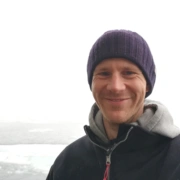
Oliver Müller
Forsker / researcher, UiB - University of Bergen

Pushpak Martin John Nadar
Stipendiat / PhD Candidate - Polar Climate, UiB - University of Bergen

Ina Nagler
Stipendiat / PhD Student - Global Climate, UiB - University of Bergen

Jean Negrel
Senioringeniør / Senior Engineer - Carbon System, NORCE Research Centre

Pål Ringkjøb Nielsen
Førsteamanuensis / Associate Professor - Polar Climate, UiB - University of Bergen

Ulysses Silas Ninnemann
Professor - Carbon System, UiB - University of Bergen

Kerim Hestnes Nisancioglu
Professor - Polar Climate, UiB - University of Bergen

Eurico Noleto-Filho
Postdoctor - Global Climate, UiB - University of Bergen

Iliana Vasiliki Ntinou
Stipendiat / PhD Student - Polar Climate, UiB - University of Bergen

Are Olsen
Professor, Forskningsleder/ Research leader - Carbon System, UiB - University of Bergen

Abdirahman Omar
Forsker II / Researcher II - Carbon System, NORCE Research Centre

Nour-Eddine Omrani
Postdoc - Global Climate, UiB - University of Bergen

Achref Othmani
Forsker / Researcher - Polar Climate, Nansen Environmental and Remote Sensing Center

Stephen Outten
Seniorforsker / Senior Researcher - Global Climate, Nansen Environmental and Remote Sensing Center

Øyvind Paasche
Head of the Climate Dynamics Department at NORCE and Senior Scientist - Climate Hazards, NORCE Research Centre

Michele Petrini
Seniorforsker / Senior Researcher - Polar Climate, NORCE Research Centre

Karlijn Ploeg
PhD candidate - Polar Climate, UiB - University of Bergen

Marie Pontoppidan
Forskningsleder / Research Director - Climate Hazards, NORCE Research Centre

Ellie Pryor
Postdoctor - Global Climate, UiB - University of Bergen

Karl Purcell
Stipendiat / PhD Student - Global Climate, UiB - University of Bergen

Charlotte Rahlves
Stipendiat / PhD Student - Polar Climate, NORCE Research Centre

Roshin P. Raj
Seniorforsker / Senior Scientist and co-leader - Polar Climate, Nansen Environmental and Remote Sensing Center

Harikrishnan Ramesh
Stipendiat / PhD Student - Global Climate, UiB - University of Bergen

Heather Regan
Forsker / Researcher - Polar Climate, Nansen Environmental and Remote Sensing Center

Eline Rentier
Stipendiat / PhD Student - Global Climate, UiB - University of Bergen

Joachim Reuder
Professor - Polar Climate, UiB - University of Bergen

Jeanne Rezsöhazy
Postdoctor - Carbon system, UiB - University of Bergen

Jonathan Winfield Rheinlænder
Researcher - Polar Climate, Nansen Environmental and Remote Sensing Center
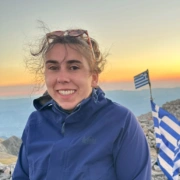
Fiona Richer
PhD Student, UiB - University of Bergen

Kristin Richter
Forsker / Researcher - Climate Hazards, NORCE Research Centre

Therese Rieckh
Postdoc - Polar Climate, UiB - University of Bergen

Birgit Rinde
Stipendiat / PhD Candidate - Global Climate, UiB - University of Bergen

Bjørg Risebrobakken
Forsker I / Researcher I - Polar Climate, NORCE Research Centre

Benjamin Aubrey Robson
Førsteamanuensis / Associate Professor - Polar Climate, UiB - University of Bergen
Saúl Rodríguez Martínez
Laboratorieingeniør / Laboratory engineer, NORCE Research Centre

Ann Rowan
Førstamanuensis / Associate Professor - Polar Climate, UiB - University of Bergen

Torunn Sagen
Stipendiat / PhD Student - Global Climate, UiB - University of Bergen

Francesco Saltalamacchia
Stipendiat / PhD Student - Climate Hazards, UiB - University of Bergen

Anne Gro Vea Salvanes
Professor - Climate Hazards, UiB - University of Bergen

Alok Samantaray
Postdoc - Climate Hazards, NORCE Research Centre

Laymara Xavier Sampaio
Stipendiat / PhD fellow, UiB - University of Bergen

Annette Samuelsen
Forskningsleder / Research Leader - Climate Hazards, Nansen Environmental and Remote Sensing Center

Richard Sanders
Forsker / Scientist - Climate Hazards, NORCE Research Centre

Håkon Sandven
Postdoctor - Polar climate, UiB - University of Bergen

Anne Britt Sandø
Forsker / Researcher - Polar Climate, Institute of Marine Research

Francine Schevenhoven
Forsker / Researcher - Global Climate, UiB - University of Bergen

Jesse Schrage
Forsker III/Researcher III - Climate Hazards, NORCE Research Centre

Lotta Schultz
Stipendiat / PhD Student - Global Climate, UiB - University of Bergen

Jörg Schwinger
Forsker II / Researcher II - Carbon System, NORCE Research Centre

Alistair Seddon
Førsteamanuensis / Associate Professor - Climate Hazards, UiB - University of Bergen

Andrew Seidl
Overingeniør / Head Engineer - Polar Climate, UiB - University of Bergen

Stefanie Semper
Forsker / Scientist - Polar Climate, UiB - University of Bergen

Edson Silva
Researcher - Carbon System, Nansen Environmental and Remote Sensing Center

Margit Simon
Forsker II / Researcher II - Global Climate, NORCE Research Centre

Tarkeshwar Singh
Forsker / Researcher - Global Climate, Nansen Environmental and Remote Sensing Center

Øystein Skagseth
Forsker / Researcher - Carbon System, Institute of Marine Research

Ingunn Skjelvan
Forsker II / Researcher II - Carbon System, NORCE Research Centre

Morten Skogen
Forsker / Researcher - Carbon System, Institute of Marine Research

Rannveig Øvrevik Skoglund
Førsteamanuensis / Associate Professor - Climate Hazards, UiB - University of Bergen

Johanne Skrefsrud
Stipendiat / PhD Student - Polar Climate, UiB - University of Bergen

Jarle Sleire
Stipendiat / PhD candidate - POLAR, UiB - University of Bergen

Lars Henrik Smedsrud
Professor - Polar Climate, UiB - University of Bergen
Angelina Smilenova
Researcher - Global Climate, NORCE Research Centre

Stefan Pieter Sobolowski
Forskningsleder / Research Leader - Global Climate, UiB - University of Bergen

Harald Sodemann
Professor - Global Climate, UiB - University of Bergen

Martine Røysted Solås
Stipendiat / PhD Student - Climate Hazards, UiB - University of Bergen

Asgeir Sorteberg
Professor - Climate Hazards, UiB - University of Bergen

Timothy Spain
Scientific Software Developer - Polar Climate, Nansen Environmental and Remote Sensing Center

Thomas Spengler
Professor - Global Climate, UiB - University of Bergen

Julia Steckling
PhD candidate - Polar Climate, UiB - University of Bergen

Hans Christian Steen-Larsen
Førstamanuensis / Associate Professor - Polar Climate, UiB - University of Bergen

Mari Steinslid
Stipendiat / PhD Student - Climate Hazards, UiB - University of Bergen

Helene Meling Stemland
Postdoktor/Postdoctor - Polar Climate, UiB - University of Bergen

Ragnhild Stolt-Nielsen
Administrativ leder / Head of Administration, UiB - University of Bergen

Anna-Marie Strehl
Stipendiat / PhD Student - Polar Climate, UiB - University of Bergen

Jørund Raukleiv Strømsøe
Seniorrådgiver / Senior Adviser, NORCE Research Centre

Lingling Suo
Forsker / Researcher - Global Climate, Nansen Environmental and Remote Sensing Center

Lea Svendsen
Førsteamanuensis / Associate Professor - Global Climate, UiB - University of Bergen

Thea Svensson
Kommunikasjonsrådgiver, UiB - University of Bergen

Ingrid Sælemyr
PhD Student - Carbon System, UiB - University of Bergen

Ingrid Sætersdal
PhD candidate - Climate Hazards, NORCE Research Centre
Victoria Taylor
Postdoc - Global Climate, UiB - University of Bergen

Daniel Thomas
Stipendiat / PhD Student - Polar Climate, UiB - University of Bergen

Fangxing Tian
Postdoc - Global Climate, UiB - University of Bergen

Amandine Aline Tisserand
Senioringeniør / Senior Engineer Ocean Observations - Global Climate, NORCE Research Centre

Jerry Tjiputra
Forsker I / Researcher I - Carbon System, NORCE Research Centre

Thomas Toniazzo
Forsker II / Researcher II - Global Climate, NORCE Research Centre

Tomas Torsvik
Forsker / Researcher - Carbon System, UiB - University of Bergen

Tamara Trofimova
Forsker II / Researcher II - Polar Climate, NORCE Research Centre

Johannes Unegg
Stipendiat/ PhD Research Fellow, UiB - University of Bergen

Vigdis Vandvik
Professor - Carbon System, UiB - University of Bergen

Øystein Varpe
Professor - Polar Climate, UiB - University of Bergen

Kristian Vasskog
Førsteamanuensis / Associate Professor - Climate Hazards, UiB - University of Bergen

Mathias Venning
Stipendiat / PhD Student - Climate Hazards, NORCE Research Centre

Torbjørg Venstad
PhD candidate - Climate Hazards

Frode Vikebø
Forskningssjef / Research Manager - Polar Climate, Institute of Marine Research

Ellen Viste
Kommunikasjonsrådgiver / Communication Adviser, UiB - University of Bergen

Philipp Voigt
Stipendiat / PhD Student - Polar Climate, UiB - University of Bergen

Nele Vollmar
Stipendiat / PhD Student - Polar Climate, NORCE Research Centre

Kjetil Våge
Professor - Polar Climate, UiB - University of Bergen

Sonja Wahl
Postdoc - Polar Climate, UiB - University of Bergen

Tsuyoshi Wakamatsu
Forsker / Researcher - Carbon System, Nansen Environmental and Remote Sensing Center
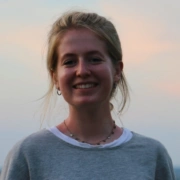
Ella Walsh
Postdoktor/ Postdoctor, NORCE Research Centre

Junbo Wang
Stipendiat / PhD Student, UiB - University of Bergen

Yiguo Wang
Forsker / Researcher - Global Climate, Nansen Environmental and Remote Sensing Center

Ryan Weber
Strategisk rådgiver / Strategic Advisor - Polar Climate, NORCE Research Centre

Julien-Pooya Weihs
Stipendiat / PhD Student - Polar Climate, UiB - University of Bergen

Agnes Weiner
Seniorforsker / Senior Researcher - Polar Climate, NORCE Research Centre

Kamilla Wergeland
PhD candidate - Climate Hazards, NORCE Research Centre
Nicholas Williams
Postdoc - Polar Climate, Nansen Environmental and Remote Sensing Center

Timothy Williams
Forsker / Researcher - Polar Climate, Nansen Environmental and Remote Sensing Center

Marianne Williams-Kerslake
PhD student - Polar Climate, Nansen Environmental and Remote Sensing Center

Ole Wulff
Postdoc - Global Climate, NORCE Research Centre

Jiping Xie
Scientist - Polar Climate, Nansen Environmental and Remote Sensing Center

Kaiyan Yao
Stipendiat /PhD Student, UiB - University of Bergen

Yue Ying
Forsker / Researcher - Global Climate, Nansen Environmental and Remote Sensing Center

George Young
PhD candidate - Global Climate, UiB - University of Bergen

Qidi Yu
Stipendiat / PhD Student - Global Climate, UiB - University of Bergen

Caglar Yumruktepe
Forsker / Researcher - Carbon System, Nansen Environmental and Remote Sensing Center

Christian Hans Quintana Zagaceta
Stipendiat / PhD Student - Carbon System, UiB - University of Bergen

Yangfan Zhou
PhD candidate - Global Climate, UiB - University of Bergen
Costijn Zwart
Postdoctor - Climate Hazards, UiB - University of Bergen

Maaike Zwier
Stipendiat / PhD Student - Polar Climate, UiB - University of Bergen

Josse van den Berg
Stipendiat /PhD research fellow - Global, UiB - University of Bergen
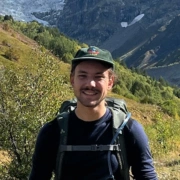
Koen van der Heijden
Stipendiat /PhD Candidate, UiB - University of Bergen

Marius Årthun
Forskningsleder/ Research leader - Polar, UiB - University of Bergen

Einar Örn Òlason
Forskningsleder / Research Leader - Polar Climate, Nansen Environmental and Remote Sensing Center

Svein Østerhus
Forsker II / Researcher II - Polar Climate, NORCE Research Centre

Lise Øvreås
Professor - Polar Climate, UiB - University of Bergen